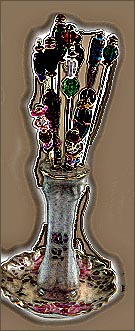

Rumble,
rumble clank shriek
clang clang. The streetcar
passed below. Within its metallic noises
the steady clop of the horses. Their
harness buckles flashed twisted tori briefly
on the crane's back. It was said crane's
calls came from a voice box as long as the neck grown
inextricably through the needing ages to a strong breastbone. The
vibrations of many crucial bones and many centuries produced
the mighty, longing, eery calls of the crane.
Someone
was calling.
Boots
raced along the pavement. Late for the car.
Late for a job. Wooden desk in a slightly dusty office on
a hot day when the window shades smelled of glue and cracked. Every
streak on the windows showed like thick cobweb and
1longed for an excuse to enter the pharmacy with the fountain, to
slip onto a stool with all the time in the world
and order and watch the white-shirted attendant's
arms illustrate the concoction with blue garters,
a marvelous conjoining of fizz and cold and cream
and chocolate which arrived
before 1's face in a thick fluted glass doubled
in the mirror, blessed by a doily and
a silver spoon.
The
streetcar was lost in the sound of the church
bell. It's spire rose up until it dissolved
in sparkle.
All
the sky sparkled on hot mornings. It
might have been the nearness of the sea.
Cleo
remembered the mission church with its school
under a thatched roof and a boat which came
once a month and rippled oryx horns
and coffee trees.
| Rose
remembered the church so close to the tracks
its stained glass window rattled with every
passage and finally broke collapsing
downward in a sharp rain which sparkled.
It had been a foggy day, there
were many, with the rain-greened grass of spring
reaching up and the tall redwoods and dark
cypress layering the moist air with their
freshness.
Before that there was the chapel at the hacienda where the boxers' women went to petition. 1 candle, never more. Covered heads, flaked paint, the smell of mud. South of the Bay. |